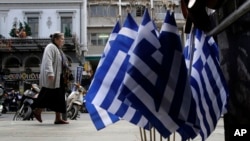Greece has said that it would not ask for a new rescue package from its international creditors if they would simply restructure its debt.
Greek Finance Minister Yanis Varoufakis said in an interview with a Greek newspaper Saturday that Greece can do without a new bailout, but "one of the conditions for this to happen ... is an important restructuring of the [current] debt."
However, its creditors, the European Union, European Central Bank and the International Monetary Fund have considered that impossible.
Although Varoufakis called the Eurozone “a shaky common monetary system" that “if not changed, will die,” he dismissed the possibility of leaving the euro group.
It was "one thing to say we shouldn't have joined the euro and it is another to say that we have to leave," said Varoufakis, because backtracking now would lead to "an unforeseen negative situation".
Athens resumed talks with its creditors last week, in an attempted to unlock the $8 billion last payment of its EU-IMF current bailout package.
Greece is struggling to pay salaries and pensions without that payment. A May 12 deadline is fast approaching, when the county has to pay over a billion dollars in debt and interest for repayment to the IMF.
Without an agreement to release the remaining EU-IMF bailout money, Greece faces default and a possible exit from the Eurozone.
In an attempt to put it finances in order, Greek has also contemplated the possibility of receiving $312 billion dollars from Germany in reparations for the Nazi occupation.
German officials have rejected that idea, saying that Germany has settled that issue in 1960, when it made a large payment to Greece.
However, speaking Saturday ahead of the 70th anniversary of the end of World War Two, Chancellor Angela Merkel said that "there is no drawing a line under the history."
Dismissing the younger generation's call for an end to responsibility for the Nazi past, Merkel said “we Germans have a special responsibility to be alert, sensitive and aware of what we did during the Nazi era and about lasting damage caused in other countries,” including Greece.
Also on Saturday, President Joachim Gauck, who has mainly a ceremonial role, said that Germany should consider Greece's demands for $312 Billion in reparations for the Nazi occupation.
"It's the right thing to do for a history-conscious country like ours to consider what possibilities there might be for reparations," Gauck told the Sueddeutsche Zeitung.
"We are not only people who are living in this day and age but we're also the descendants of those who left behind a trail of destruction in Europe during World War Two — in Greece, among other places, where we shamefully knew little about it for so long," said Gauck.
Many in Greece blame Germany, their main creditor, for the tough austerity measures and record high unemployment rate deriving from two international bailout packages in the amount of about $272 billion (240 billion euros).
Last month, Economy Minister and Vice-Chancellor Sigmar Gabriel called the Greek demand "stupid," saying that Greece wanted to squeeze some leeway out of its Eurozone partners, to mend its financial situation.





